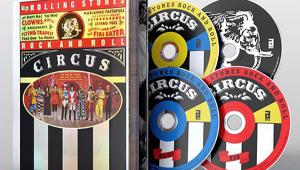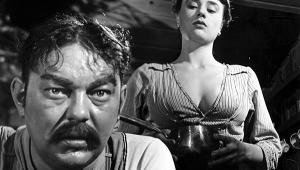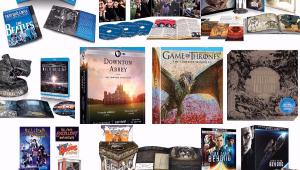DVD Review: Inland Empire Page 5
 With Inland, you get a mesmerizing, soul-rattling movie, disturbing and ravishing sound and image, a consistently fascinating bunch of extras, and - a first for a Lynch-supervised DVD - chapter breaks. (No, there's no "scene selection" menu - which is just fine, since we're spared those cutesy little titles the geeks at the DVD production house always come up with - and you can't just punch in the chapter number. But you can skip from one judiciously chosen scene break to the next.)
With Inland, you get a mesmerizing, soul-rattling movie, disturbing and ravishing sound and image, a consistently fascinating bunch of extras, and - a first for a Lynch-supervised DVD - chapter breaks. (No, there's no "scene selection" menu - which is just fine, since we're spared those cutesy little titles the geeks at the DVD production house always come up with - and you can't just punch in the chapter number. But you can skip from one judiciously chosen scene break to the next.)
Those extras include over an hour's worth of deleted scenes, 16 in all. None of them have the power of the scenes that made the final cut or offer any stunning insights into what the hell's going on here. But they do show Lynch trying out variations on his themes, using the cameras, actors, sets, and so on to explore his concerns. The idea of actually creating on the set has, sadly, become old hat, now that a gang of storyboard addicts has taken over Hollywood.
In a similar vein, the "Quinoa" section, which many will likely dismiss as a glorified cooking lesson, is actually an exercise in no-budget filmmaking (similar to the quickie film-school lessons that Robert Rodriguez likes to put on his DVDs). A simmering pot offers Lynch an opportunity to reminisce, which - thanks to the lighting, soundtrack, and storyteller - transforms into something of a campfire tale. The only real snore is the short film Ballerina, which is pleasant enough to watch but nowhere near as riveting as everything around it.
The best bonus, by far, is Lynch 2, a 30-minute documentary of David at work. And he really does work, manufacturing his own props, adding details to the sets, designing the lighting effects, and operating the cameras while performing the director's usual myriad duties. It's also great to see Lynch sans the whimsical goofball persona he tends to adopt for interviews (and which he dons for much of the anecdotal "Stories" section). Here he's a highly focused, no-nonsense taskmaster, berating slacker crewmembers, dealing expertly with the inevitable crises, and, best of all, leading by example. Most directors are pampered, bullhorn-toting nerds, so it's exhilarating to watch a real filmmaker at work.
Given that all-too-rare dedication to the creative process, it's not too surprising to find that Lynch cares deeply about how you experience his films. And he's well aware that, given its experimental-for-the-masses approach, Inland is far more likely to be seen, and appreciated, in home theaters than movie theaters. All of which explains this emotional plea (in the "Stories" section) to his audience:
"If you're playing [Inland] on a telephone, or on your computer, you will never in a trillion years experience the film. You'll think you have experienced it, but you will be cheated. It will be a weak - you'll be experiencing weakness, an extreme putrefication [sic] of a potential experience in another world. So, don't let your friends, or some television advertisement, trick you into accepting weakness. It's such a sadness. Power in that world is critical. Everything has been worked on to be a certain way, and if you don't have a setup for your films, it's a joke. It's just the most sickening, horrifying joke. And this world is so troubled, and it's such a sadness that you think you've seen a film on your fucking telephone. Get real."
Amen.
more Entertainment reviews Back to Homepage What's New on S&V
- Log in or register to post comments




























































